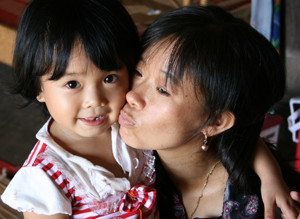When Saving Money Means Saving Lives
Microsaving Among Women in Viet Nam
March 2011—Ninh Binh province was home to Viet Nam's first imperial capital in the tenth century, but its past glory means little to Chi Hong.* An HIV-positive widow who lives with her two school-age children in a small village, she cannot regularly get her AIDS medicines locally and so must travel three hours north to the modern capital, Hanoi. Supporting her family with a small vegetable stall, Chi Hong struggles to scrape together resources to pay for her trips to the doctor. Some months she has been unable to go.
Chi Hong's story is a common one in rural areas and isolated villages across Viet Nam and throughout Asia. Even when healthcare is available, those under treatment for HIV must often deplete their meager savings to travel grueling distances, an economic burden that weighs heavily on women like Chi Hong, who contracted HIV from her now-deceased husband and raises her children alone.

|
HIV-positive widows in Viet Nam saved money for health
emergencies—and children’s school fees—through
collective savings groups developed by TREAT Asia.
|
Enter the Ninh Binh savings groups.
Recognizing that treatment access often hinges on the simple ability of patients to get to the doctor, TREAT Asia set up a small fund in 2008 to support medical transporation for members of two local HIV women's self-support groups. But that money eventually ran dry. Casting about for a way to make the emergency fund sustainable, TREAT Asia community manager Jennifer Ho considered microfinance, a system that makes small loans available to low-income people, often women who want to establish a small business.
Interested but Wary
The women of Ninh Binh weren't thinking about commerce, but they occasionally needed modest sums of money to keep their lives on track. Why not set up a savings-and-loan—a sort of borrowing collective—financed and organized by the women themselves so that they could help each other out in the event of health-related emergencies? Ho made a suggestion to two groups: each woman could put in 10,000 Vietnamese dong per month (US $0.75), borrow against the fund if they needed to, and pay the loan back with only modest interest. At the end of the year, group members would get their money back with an equal share of the interest generated from the loans.
The women were interested but they were wary. Microfinance was an unfamiliar concept in Viet Nam, and personal trust between group members was a question as well. "They raised issues like, what if the person in charge of the money spent it, or what if they didn't give it to the right person?" remembered Nguyen Thi Diu of World Concern Vietnam, who worked with TREAT Asia to implement the community savings program.
To help ensure transparency and accountability, the women's groups developed their own guidance on the types of loans they would make and the process of repayment. "We suggested that not just one person would keep all the money but maybe two or three in the group, and that they would decide together who would borrow the money," said Diu. "So then it was OK for them. Before then, the women's groups had a strong sense of solidarity, but now they really had to learn to trust each other."
The two Ninh Binh savings groups were established in mid-2009 with around 15 women in each group. Although the original idea was to support medical care, members soon decided to extend help to women like Chi Thuy, a widow whose seasonal income as a rice farmer made it difficult for her to pay school fees up front for her two young children, one of whom is HIV positive. "Living with HIV and bringing up children is very difficult," explained Diu. "So the women agreed to lend money sometimes for school fees as well."
After one year, the two community savings projects far exceeded expectations: more than 90 percent of the women contributed to the funds on a regularly basis and they repaid 100 percent of their loans. "By encouraging the participants to develop the habit of saving, they were able to provide each other with much needed financial assistance," said Ho.
Although the TREAT Asia project in Ninh Binh officially ended in 2010, the women's community savings projects live on. "Our goal was to help create a stronger community for HIV-positive women," said Ho. "Now, they've taken that goal into their own hands."
*Chi Hong and Chi Thuy's names have been changed in this story to preserve their privacy.